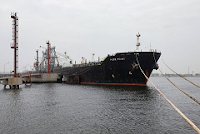Russian
producers have found ways to sell oil using fewer Western ships and insurance
services, making it difficult for the West to enforce the existing price cap
because the companies facilitating the trade are outside of their remit.
The G7 countries along with the European Union and Australia
imposed the price cap mechanism on Russian oil last December, followed by a cap
on fuel from February this year. Initially, EU countries agreed to review the
price cap every two months and to adjust it if necessary while the G7 would
review as appropriate including implementation and adherence.
The G7 has not reviewed the cap since March 2023 and people
familiar with G7 policies said the group had no immediate plans to look into
adjusting the scheme.
There were some talks in June or July to do a review, or at
least talk about it, but it never formally happened.
While some EU countries were keen for a review they said
that there was little appetite from the United States and G7 members to make
changes.
The sidelines of the upcoming UN General Assembly later this
month could serve as an informal platform for talks on the cap
The mechanism allows third countries to buy Russian fuel
using Western ship insurance if there is proof the purchase does not exceed
price limits of US$60 per barrel for crude, US$45 per barrel of heavy fuel and US$100
per barrel of light fuel such as gasoline and diesel.
The idea was spearheaded by Washington to cut Moscow's
revenues amid its war on Ukraine while avoiding market disruptions as a result
of an EU ban on Russian oil.
Benchmark Brent oil futures are trading at their highest
this year at above US$90 a barrel, raising the value of global crude, including
Russian Urals.
Russia's
finance ministry said the average price on its flagship crude grade Urals has
recovered to US$74 a barrel on average in August - well above the US$60 a
barrel cap - and up from an average US$56 in the first six months of the year.
Russia was forced to cut exports of oil and products
immediately after the price cap imposition as it struggled to find enough ships
to transport all of its output.
However, the country has managed to move most of its exports
into the hands of domestic or non-Western foreign shippers, which do not
require Western insurance coverage.
According
to Reuters, at least 40 middlemen, including companies with no prior
record of involvement in the business, handled at least half of Russia's
overall crude and refined products exports between March and June.
While
mostly dark fleet of tankers with murky ownership was being now used to
transport Russian crude, Western ships were still involved in moving products
since those were harder to police, an industry source said.
According to LSEG data, Russian crude has been trading above
the cap since mid-July and is currently being traded at around US$67 a barrel
at Russian crude terminals. Russian refined products such as fuel oil and
diesel have also surpassed their caps.
A US Treasury official said this week the cap was still
effective as it had helped cut Russian revenues. He said the group would stay
nimble but added there was no plan for an immediate revision.

